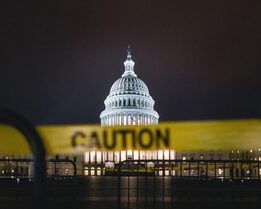 The House of Representatives has elected a new Speaker, potentially improving the prospects of passing funding bills before the November 17 deadline to prevent a government shutdown, with the Coast Guard Authorization Act being one of the key funding components likely to pass smoothly, while the National Defense Authorization Act faces more complications due to numerous amendments and disagreements. Congress Has Leadership Again - Will That Avert a Shutdown?
by Aniela Szymanski, Chief Policy Officer Yesterday, the House of Representatives voted in a new Speaker, which is promising news given the November 17, 2023, end of the Continuing Resolution that is keeping the government functioning for now. If Congress does not pass funding bills, or another Continuing Resolution, by November 17, the federal government will shut down. With a new Speaker in place, however, the House can again start voting on bills, including the funding bills. During the House's absence of leadership, the Senate has been working on funding packages to tee them up for the House's vote as soon as the new Speaker was in place. Some members of the House, however, have already said that they do not want to vote on packages of funding bills and are intending to force individual bills be passed, slowing down the process. The Coast Guard Authorization Act, HR 2741, was reported out of the Transportation and Infrastructure Committee and is awaiting a vote by the full House. The Coast Guard Authorization Act is one component of needed funding, while the National Defense Authorization Act is the other. The NDAA is currently undergoing compromised changes between the House and Senate before being brought for a vote by the House. Historically, the Coast Guard Authorization Act is much less controversial than the NDAA and can pass much more quickly. Indeed, HR 2741 was a bipartisan bill that garnered no notable dissention in the committee process, which is a good sign it will sail through a House vote whenever it is brought to the floor by the Speaker. The NDAA process, on the other hand, gets bogged down with hundreds of amendments as members of Congress attempt to use it to push through their pet projects in their districts, making it much more difficult to reconcile not only the two parties in Congress, but also the two chambers of Congress. So now that the House has a Speaker, there is at least a chance that the necessary funding bills will be passed by November 17, but the Coast Guard still must maintain a strong voice to ensure that their funding is not overshadowed by the NDAA. CWOA leaders, Mike Little and Aniela Szymanski, have been staying in constant communication with Congressional staffers and military service organization partners to keep the Coast Guard's funding amongst the "must pass" bills before November 17.
2 Comments
Tony Robinson
10/26/2023 12:06:23
Thanks for the update. Hopefully, the House will get back to business and work together. Not holding my breath for this to happen based on history of the two parties.
Reply
James Pulse
10/26/2023 17:44:58
What are the chances H.R. 5641 passing this year? What can we do to push this through at the state level?
Reply
Leave a Reply. |
AuthorThe views expressed in the articles in this publication are solely those of the authors. They do not necessarily reflect the opinions of the organizations for which they work, CWOAUSCG, the U.S. Coast Guard, the Department of Defense, the Department of Homeland Security, or the U.S. government. Archives
June 2024
Categories
All
|


 RSS Feed
RSS Feed
